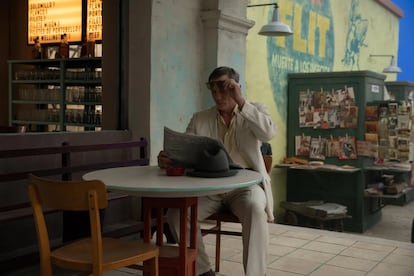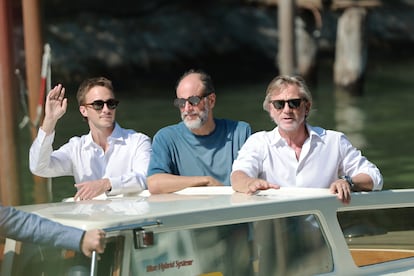At the beginning of his films, Agent 007 always shoots the audience. Daniel Craig did it up to four times. And so well that he left the audience mortally wounded when he decided to leave. Finally, he returned for a fifth and final installment. But, afterwards, he left to pursue new adventures. And, this Tuesday, he hit the audience again from the screen with the most daring assignment of his career: a radically opposite role. From impeccable hetero icon, magnetic heartthrob for so many Bond girls, to gay writer addicted to drugs, alcohol and intercourse, with explicit sex sequences included. Although Luca Guadagnino, director of Queerpresented in competition at the Venice Film Festival, joked that the two characters might not be so far apart: “Nobody knows James Bond’s wishes. Period. The important thing is that he completes the mission correctly.”
The filmmaker himself had another attraction for the film: it is the film he had dreamed of making since he read William S. Burroughs’ novel of the same name at the age of 17. “A book with a different title, without judgement towards behaviour, with romanticism. It changed me forever,” he confessed to the press. The work, written in 1952 and unfinished, could not be published until 1985: an intense homosexual love soaked in opium and mezcal was too scandalous for the time. Perhaps it still is today for some. At the Mostra, however, it added another reason to make it one of the most eagerly awaited films. The truth is that it ends up seducing, but after a long excess of preliminaries.
“I said yes because of this great man at my side [Guadagnino]. I’ve wanted to work with him for 20 years. If I hadn’t been in this film and had seen it, I would have wanted to be the lead. These are the kind of films you ask to be made, the ones that challenge you,” said Craig, to whom many of the press questions were directed. And all eyes, of course, during the screening. Queerplays William Lee, an American expatriated to Mexico City in 1950, who spends his days in bars, often alone, but always eager for the company of a tequila, a chat and some lover. A kind of alter ego of the writer, considered one of the fathers of literature beat. Until the Flash, also autobiographical, by a young student.
Lee burns and becomes obsessed. The boy reciprocates at times, to a certain extent, it seems, more and more. The film builds a man in love, at once devoted and lost in romance, as well as in its other pleasures. And Craig also gives himself to the film heart and soul, literally, along with co-star Drew Starkey. An intimacy coordinator accompanied them to work out the more delicate moments. “We rehearsed for many months before filming. There is nothing intimate about sex sequences on a set, because there are so many people watching you, but we wanted it to be touching, realistic, as natural as possible,” said the star.
It is difficult for him to win an award, because the Adrien Brody seen in The Brutalist It seems unattainable. But his performance deserves at least applause, both for the risk and courage as well as for the result. And for a long job of watching interviews with Burroughs beforehand, to reproduce his measured speech, but also to intuit what he was really like inside.
And Guadagnino wasn’t even going to offer him the role. He admired Craig, but he saw it as utopian: “I had an intuition that I stifled. I’m very pragmatic. Movies have to be made. His name was suggested to me. I said: ‘He’ll never want to.’ But I tried it, and he accepted. One of the main characteristics of great actors is their generosity, the ability to be very mortal on screen. Few legendary actors show their fragility and Daniel is one of them.” And the film also thanks the diva for supporting it in the first half, when the rest doesn’t quite work. Perhaps the filmmaker was betrayed by his affection for the book and the character. He knows them very well, he adores them. And he seems to take it for granted that this will also be the case for the public, without worrying about pampering and deepening his portrait further. So the beginning of Queer It slides in a flat, almost superficial manner, between shots, fellatio and a quasi-canonical narration.

Fortunately, halfway through the two hours and 20 minutes, something changes. In the plot, with the two lovers’ trip to South America. In the direction, with a greater display of the visual and metaphorical talent to which the Italian filmmaker has become accustomed. And, in general, in the sensitivity of the whole, which enriches its protagonist, reinforces its discourse on love, loss and loneliness, and grows towards an exciting epilogue.
Although the opposite opinion could also be heard at the Mostra. And many others. Guadagnino almost always divides and gives people something to talk about. Like when he was asked about his own addictions at the press conference and he said: “I go to sleep very early, I have never taken drugs, nor smoked a cigarette and I have lost 15 kilos through a diet. I am quite rigorous. I can count on two hands the lovers I have had. And, having said that, I like the idea of seeing people and not judging them, of making sure that you identify with even the worst person.”
This is the filmmaker in his works, in interviews, who knows if in life. Direct, provocative, challenging, stimulating, perfectionist, controversial, controlling. Intriguing in I am loveoverwhelming in Call Me By Your Name. Pretentious, however, in Blinded by the sun. And turned off in To the bone, his last visit to the Lido, in 2022, at least according to most critics: the jury awarded him the prize for best direction. Rivalshis previous album, also left reviews of all colors.
It was supposed to open last year’s festival, until its premiere was delayed by the actors’ and screenwriters’ strike that paralyzed Hollywood. It was during that filming, in any case, that Guadagnino finally began to conceive, Queer. The project had always been in h
is head. Among other things, because of the “loyalty” he owed to the teenage Luca who was so shaken by the novel. But it was only recently that it began to take shape, with the same scriptwriter as RivalsJustin Kuritzkes.

Guadagnino hopes to have filmed a work burroughsiana and also a nod to the cinema of Michael Powell and Emeric Pressburger, influential creators in the forties and fifties of films such as The red shoes either Black daffodil. “I hope that in the end the viewer can feel a reflection on oneself. Who are we when we are alone, and who do we seek? Who do we want by our side, whoever we are?” he asked. And he quoted the last words from Burroughs’ diary: “Our love will grow wider than empires.” The press conference ended. The conversation will continue. As always with him.
Greek creator Athina Rachel Tsangari was also credited with a certain ability to generate controversy. For her long collaboration with the most famous provocative filmmaker of her country, Yorgos Lanthimos. And for her own film career, whose last chapter, Knightfrom 2015, was a satire on toxic masculinity. Indeed, with Harvestthe second feature of the day in the competition, based on a novel by Jim Crace, brought a few topics of debate. But, above all, a coherent, solid and beautiful film, shot on nostalgic 16 millimeters.
English countryside, late 16th century. The master and the farmers live in relative harmony, sharing the crops and their fruits without too many conflicts. But more and more clouds begin to surround the community. The destruction caused by some neighbours after eating wild mushrooms; the arrival of unexpected visitors, including a designer charged with turning his approximate vision of nature and property into precise maps. And, above all, the great storm of the agricultural revolution: from being collective property, the land must pass to the property of the great landowners. Harvest It tells of the threat of progress, the limits between impotence, pusillanimity and servitude, and the manipulation exercised by power. It unleashes wars, but never fights them: it prefers to leave them to the poor. Five centuries ago, the same as today. The same cunning. The same impudence.
All the culture that goes with you awaits you here.
Subscribe
Babelia
The latest literary releases analysed by the best critics in our weekly newsletter
RECEIVE IT
#Daniel #Craigs #radical #change #astonishes #Venice #festival #heterosexual #icon #James #Bond #explicit #gay #sex #Queer
